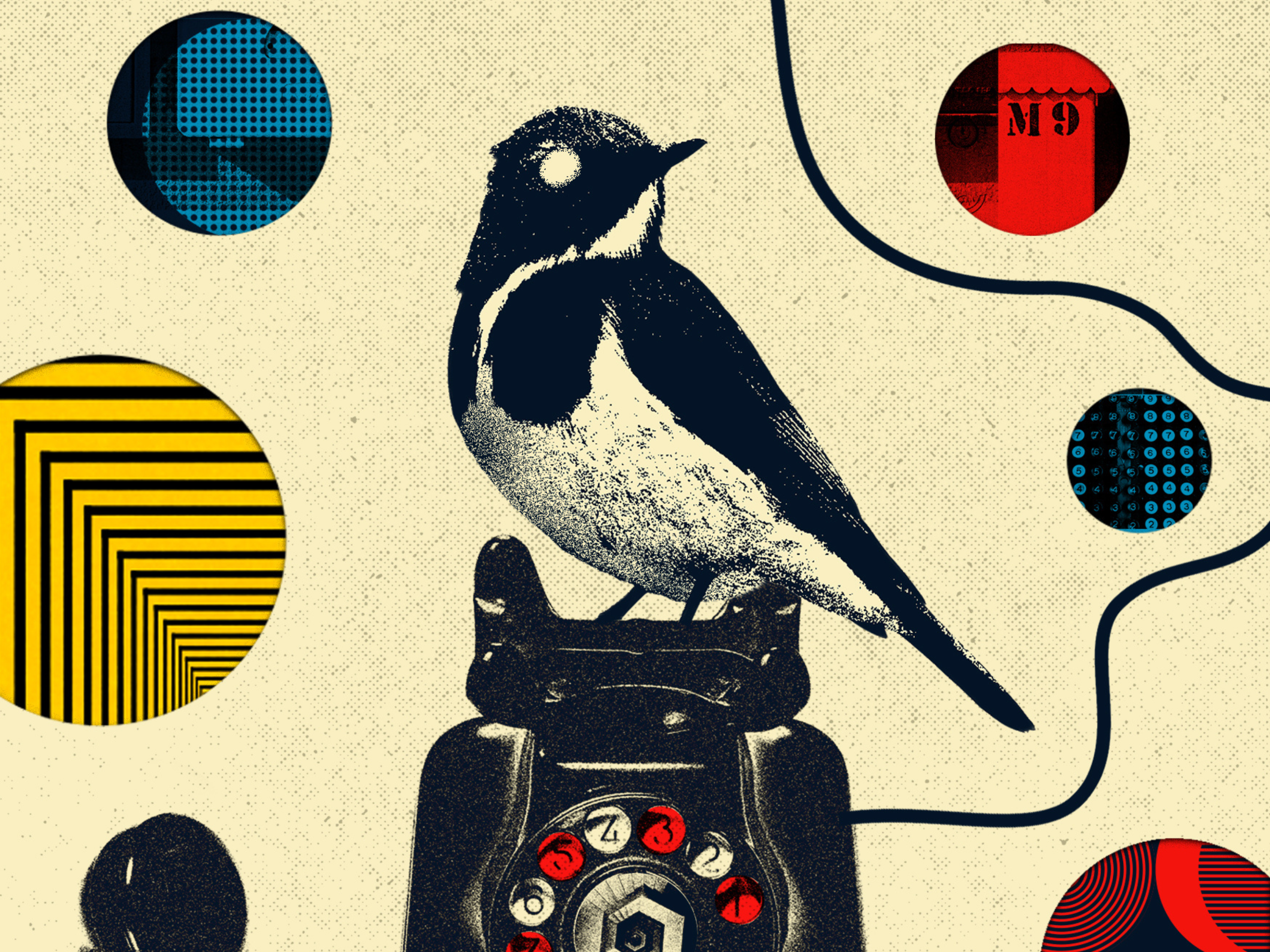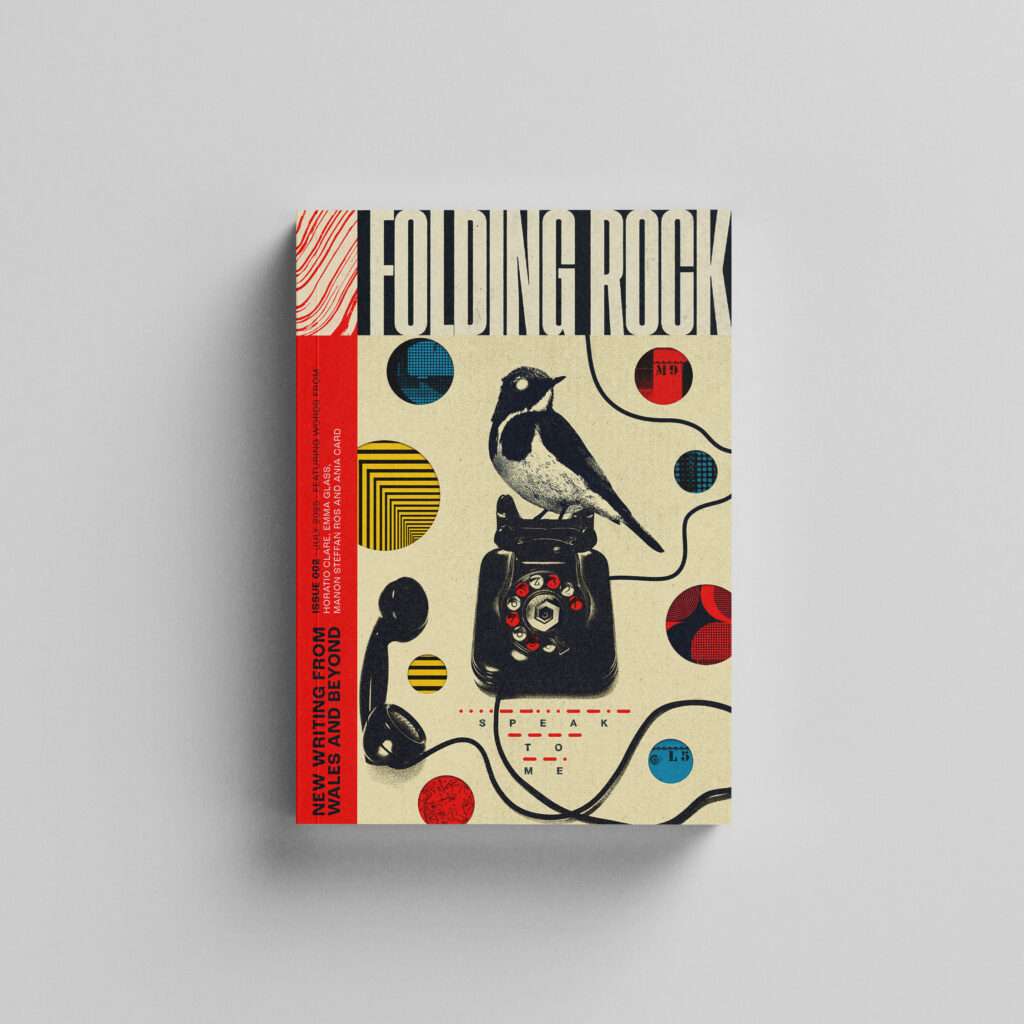
You might have noticed that when we released the first issue of Folding Rock, we included an audacious ‘00’ in front of the ‘1’. It would take thirty-three years to fill both of those ambitious little noughts. Who knows what will happen within the next three years? Let alone the next three decades. But let it be known that as co-founders of these pages, Rob Harries and I mean for this exciting time to be the very beginning of something that becomes an indelible part of the literary fabric of Wales – of the UK, in fact. We mean for it to be refounded and reinvented over and over again, growing in tandem with the writers and readers whom it’s here for. Call that double-0 a statement of intent.
I’m writing this editorial fresh from this year’s Hay Festival, where I was lucky enough to be involved in a handful of events and, most importantly, in the Hay Writers at Work programme, supported by Literature Wales. As a partner of the programme, we’ve been busy sharing interviews on the Folding Rock website to spotlight each of these exciting writers, all of whom are already on their way to big and brilliant things. Well worth paying attention to, for those of you beginning to build your own creative life in writing.
The best part about meeting this year’s cohort, however, was being able to sit down and hear from the future contributors of this magazine. We have an opportunity here that we are all too aware of: to build something from scratch and, hopefully, without existing entanglements or previous ‘ways of doing’ things, to lock the wheel. We can start as we mean to go on.
Having a frank discussion with a room of active and emerging writers from Wales was far more useful than any board meeting. We talked about fair renumeration, fair rejections, and about how we can make the whole submissions process as transparent as possible. If literary journals play such a vital role for writers’ journeys (and they do, as has been said over and over these past few months), then it is especially vital that they listen carefully to what those writers have to say. Rob and I feel strongly about the sharing of information – in both directions. So, as the ground settles for Folding Rock (pun absolutely intended), expect more guidance on our website, more events to offer insight, and more open conversations about the things that matter most to writers in Wales.
But of course there’s another essential side to why we do this. There’s you: the readers. Whether you pick up the occasional pen or not, we also need to make sure that at the end of all this – the commissions, submissions, rejections and edits – you have something to buy and hold and read that is nothing short of excellent. There are no writers without readers. Bringing together the best stories we possibly can is something Rob and I will be continuing to strive for with each new issue that comes out.


And so to Issue 002. Language was one of the first themes we knew we wanted to explore – not only from our home within a multilingual nation, but also from an awareness of the evergreen complexities in how we communicate. In the vocal, the visual, the typewritten and the unspoken. How we speak to ourselves, and how we speak to the world.
Our intention is that these themes we set are a springboard for inspiration – not a means of creative limitation. We were intrigued to see in how many directions this idea of communication would be taken, but we could never have guessed quite how diverse the resulting issue would be. In these pages you’ll find language lost and found, art that speaks across time, and voices from the most unexpected places (not excluding the searing words of a small rabbit). These essays and stories swing from the chilling to the hilarious, from the deeply thought-provoking to the joyous and hopeful.
But the prevailing feeling I am left with, as we send this second issue off to print, is admiration. As a writer myself, reading submissions and working with our contributors to get the most out of their pieces is, undoubtedly, food for my own practice – how could it not be? And in this instance, we’re privileged to be publishing work that genuinely pushes the boundaries of creative thought and language: work, like Horatio Clare’s essay, that challenges how we see the world as well as how we describe it; or like Beth Preece’s dive into the tangled depths of what lies between the words on the page, and what we really mean. I felt awe at the layered intention and sentence-play of Amy Grandvoinet’s story, astonishment at the maturity of Hannah Dafforn’s fiction debut, and perfect jealousy for the masterful voice of Liz Churchill’s Mr Binklebee. All this, and so much more.
When we were in Ireland this spring, celebrating our Welsh magazine at the long-standing Cúirt Literature Festival, we asked a number of editors of that country’s thriving journal scene how they managed the dynamics of there being so many magazines at once. Is it not competitive?
And they all responded with a similar answer: competition is good. It’s healthy. It gives us a reason to be better.
This is exactly what we need. And already I can feel it working in the stories here, already in the exciting projects being dreamt up by the Writers at Work, and in so many of the conversations we’ve had since launching Issue 001 that rainy Thursday night in Cardiff. So, if you are a creator yourself: fuel up on these pages and let’s have more, more, more. Be ambitious. Join the healthy competition.
In the meantime, I very much hope you enjoy reading Issue 002. I hope it speaks to you in some way. And I hope that we’ll be looking back at this spring and summer in thirty-three years’ time – with its flurry of launch events and fresh optimism; a glimmer amid the greater fears and worries of the world – as the first well-meaning words in a dialogue that would spread to many, many more voices.
May 2025

Featuring new work from writers including Horatio Clare, Emma Glass, Manon Steffan Ros and Ania Card.
The multitude of languages we use to communicate, be they spoken or non-verbal, are arguably the most integral – and human – elements of our social existence. A painting can change a life. A telephone call can save one. A smile can, at times, reveal more than the most epic of soliloquies, while at others, a whisper can be deafening.
Non-fiction and Managing Editor
Kathryn is a writer, editor and creative producer from the south coast of Wales. She has worked with independent publishers such as Parthian and most recently as the programme and content producer for New Writing North. She is the recipient of a Rising Star award from both The Bookseller and The Printing Charity. Kathryn’s own work has been widely commended and published, including an essay collection, Seaglass, with Calon Books in May 2024 and articles for the likes of The Guardian, The Scotsman and The Bookseller. Her essay, ‘Return to Water’, was a category winner in the New Welsh Writing Awards in 2021.
Kathryn takes the lead on creative non-fiction, as well as focusing on publicity, events, partnerships and fundraising.